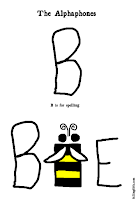I haven’t posted on the Scripps Spelling Bee event for some time now – since 2011 in fact. As in so many previous competitions, thiswas a nail-biter to the end and finished in a tie. It’s the second tied win in two consecutive years. Prior to 2014, there hadn’t been a tie for fifty-two years. In the end, the two demon spellers were Gokul Venkatachalam from Missouri and Vanya Shivashankar from Kansas, beating off 283 other, determined competitors from the length and breadth of the USA.
 |
| Thanks to FallingFifth.com for ‘The Alphaphones’ |
As soon as I looked at the names of this year’s winners, I thought there was something familiar about Vanya’s family name. And there was! Her sister Kavya won the event in 2009 with the word ‘laodicean’, about which I wrote at the time here.
At the end of 2015’s gruelling competition, Shivashankar correctly spelled ‘scherenschnitte’ meaning ‘scissor cuts’. Easy if you happen to speak German! Venkatachalam sealed his place on the winner’s rostrum with ‘nunatak’, an Inuit word meaning an exposed, rocky part of a ridge surrounded by glacial ice.
If you’re wondering how the Spelling Bee could end up in a draw, here’s how Scripps explained it last year:
Once there are three spellers left in a round, the next round begins with a 25-word list. Ordinarily, a winner is declared if one speller misspells and the remaining speller correctly spells two words in a row. If no winner is declared before the list has been exhausted—or there are not enough words left for two consecutive spellings—co-champions are announced.
These days the spellings are unquestionably tougher than when an eleven-year-old Frank Neuhauser, the son of a Kentucky stone mason, won the competition in 1925 with the word ‘gladiolus’. In those days the prize was $500 in gold, a bicycle and a visit to the White House to meet the then president Calvin Coolidge. Today’s champions each take home an enormous trophy and $35,000 in cash. And, while I don’t expect this year’s winners will get the ticker tape reception and the enthusiastic crowds bearing bouquets of gladioli that Frank received, it’s certain that there is no lessening in the intensity of interest many people in the United States feel for this annual, fascinating encounter.